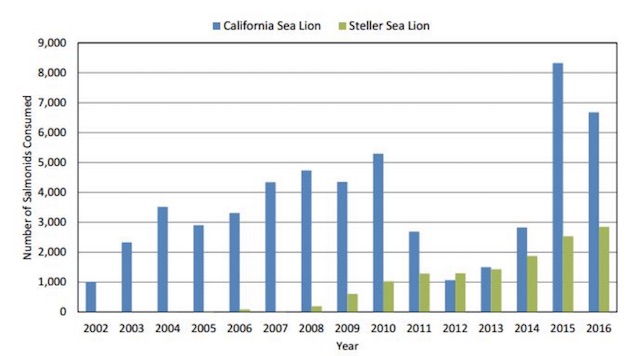forum
library
tutorial
contact

Congress Seeks to Weaken the
Marine Mammal Protection Act
by Maya L. Kapoor
High Country News, July 28, 2017
|
the film forum library tutorial contact |

|
Congress Seeks to Weaken the
by Maya L. Kapoor
|
House Republicans hope killing sea lions will restore waning salmon populations
 On Wednesday, July 26, the House Committee on Natural Resources passed 21 bills during a markup session. One, H.R. 2083, aims to protect salmon by allowing permit holders to kill California sea lions in the Columbia River. Critics caution the bill undermines federal protections such as the Endangered Species Act, Marine Mammal Protection Act, and National Environmental Policy Act, without addressing the root causes of salmon declines, which include habitat destruction and dams.
On Wednesday, July 26, the House Committee on Natural Resources passed 21 bills during a markup session. One, H.R. 2083, aims to protect salmon by allowing permit holders to kill California sea lions in the Columbia River. Critics caution the bill undermines federal protections such as the Endangered Species Act, Marine Mammal Protection Act, and National Environmental Policy Act, without addressing the root causes of salmon declines, which include habitat destruction and dams.
Here's what you need to know about H.R. 2083, the "Endangered Salmon and Fisheries Predation Prevention Act."
Sea lions have noticed that Pacific Northwest dams conveniently funnel fish into predators' mouths.
Well, not exactly. But the Pacific Northwest's Columbia River is an important migratory pathway for salmonid fish, which live in the sea as adults but swim back upriver to spawn. The fish ladders built to help salmon bypass the river's many dams attract marine mammals, which congregate near the entrance of the ladders and feast. For example, in 2016 California sea lions ate some four percent of salmonids migrating through the Bonneville Dam, according to a report by the U.S. Army Corps of Engineers. Because salmonid populations have nosedived in recent years, these seasonal feeding frenzies trouble fisheries managers.
The bill increases the number of sea lions people can kill, and who can kill them.
Currently, the states of Washington, Oregon and Idaho may take individually identifiable California sea lions near Bonneville Dam that are eating federally listed salmon and steelhead. Under the new legislation, any California sea lion found upstream of river mile 112 of the Columbia -- roughly the location of the Portland Airport -- or in tributaries would be considered a "problem" animal and could be targeted. Annually, a permit holder would be able to kill up to 100 sea lions for the duration of the permit. Cumulatively, all permit holders would be able to take up to 10 percent of the "potential biological removal" level calculated by NOAA, or a total of 920 animals per year.
The Columbia River Intertribal Commission -- which includes the Nez Perce Tribe, the Confederated Tribes of the Umatilla Indian Reservation, the Confederated Tribes of the Warm Springs Reservation of Oregon, and the Confederated Tribes and Bands of the Yakama Nation -- backs the bills, as does the Cowlitz Indian Tribe.
In testimony in support of the bill, the commission stated that current sea lion management was inadequate because of the restrictions imposed by the Marine Mammal Protection Act. Commission members need "timely solutions to protect our ceremonial, subsistence and commercial harvests for salmon, lamprey and sturgeon."
Critics of the bill say that it misses the point.
According to Rep. Jared Huffman, D-California, scientific research has found that sea lions are not the biggest threat to the Columbia River's salmon and steelhead -- dams are. Huffman stated that to protect salmon populations in the long run, fish passage and habitat on the Columbia would have to be addressed. Criticizing what he called the bill's "ready, shoot, aim" approach, Huffman unsuccessfully introduced a bill amendment that would require environmental review and public comment, and would protect other wildlife species. Calling dams "predator traps," Huffman tried through his amendment to require sufficient investigation into nonlethal alternatives before taking sea lions and to reduce the overall number of sea lions that could be taken each year.
Rep. Doug Lamborn, R-Colorado, disagreed with Huffman's amendment. He objected particularly to a permit holder's having to identify that a sea lion had preyed on salmon before killing the sea lion. "You're almost asking for Miranda Rights at that point," he said, calling the entire amendment too restrictive.
Ranking committee member Mike Bishop, R-Michigan, opposed the amendment for adding "additional bureaucratic red tape" that went against the purpose of the bill.
Even ranking minority leader Rep. Raúl Grijalva, D--Tucson, voted against the amendment, saying the bill itself was "too far gone to save."
The pinniped party may be ending soon.
The unamended bill heads to the full Congressional House next for consideration.
Related Pages:
Predatory Sea Lions Are Detrimental to Columbia River Fish Runs by Gerry Lewis & Paul Ward, NW Fishletter, 5/1/17
learn more on topics covered in the film
see the video
read the script
learn the songs
discussion forum
